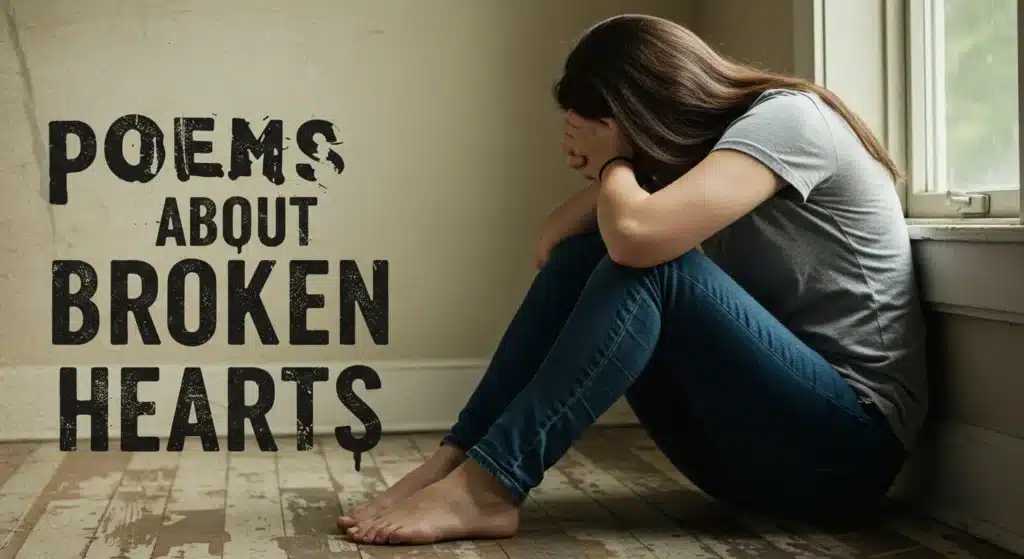We embark on an intimate exploration of short poems about broken hearts, where succinct verses encapsulate the profound depths of sorrow, betrayal, and eventual rebirth.
These poetic gems act as silent companions, reflecting the turmoil of shattered affections and guiding souls toward mending.
Amidst the chaos of modern relationships ranging from fleeting digital connections to enduring bonds severed by fate short poems distill universal anguish into lines that heal and inspire.
Drawing from literary heritage and contemporary voices, we present original works, classic excerpts, and insightful analyses to illuminate heartbreak’s multifaceted nature.
The Profound Resonance of Short Poems in Heartbreak
Understanding the Appeal of Brevity in Emotional Expression
Short poems about broken hearts captivate with their precision, cutting through emotional clutter to deliver unfiltered truth.
We note that in an age of information overload, the conciseness of these poems offers respite, allowing readers to absorb profound insights without exhaustive narratives.
Rooted in traditions like ancient Roman epigrams or Chinese jueju poetry, this form prioritizes essence over elaboration, making each syllable a vessel for raw sentiment.
Psychological Benefits of Engaging with Concise Verse
Psychologically, interacting with short poems facilitates emotional processing by mirroring the brain’s need for quick, digestible catharsis during grief. Studies in expressive arts therapy suggest that such brevity aids in reducing rumination, promoting a sense of validation and control. We observe that reciting these poems can become a ritual, embedding affirmations of resilience into one’s psyche.
Original Poem: Shadows of Yesterday
Fading echoes in the quiet night,
Your absence carves a hollow light.
Yet from this void, a spark ignites,
Healing whispers in the endless fights.
This original piece exemplifies how short forms evoke lingering pain while hinting at dawn’s promise.
Harnessing Poetry’s Strength to Voice Heartache
The Rhythmic and Imaginative Power of Poetic Language
Poetry’s inherent rhythm and imagery provide a structured outlet for the disarray of heartbreak, transforming chaos into coherent narratives. We draw parallels to oral histories where verses preserved tales of lost love, evolving into modern slam poetry that amplifies personal stories. This strength lies in evoking sensory experiences— the sting of tears or the chill of solitude—making abstract pain palpably real.
Original Poem: Fractured Harmony
Strings once tuned in lovers’ song,
Now snap and fray where we went wrong.
In discord’s wake, a solo plays,
Melody mends in unforeseen ways.
Here, musical metaphors underscore poetry’s ability to harmonize discord.
Historical Contexts Shaping Heartbreak Poetry
From medieval troubadour laments to Victorian elegies, poetry has chronicled heartbreak’s evolution, reflecting societal norms on love and loss. We highlight how these historical layers enrich contemporary short poems, blending timeless themes with current sensibilities.
Symbolic Layers and Metaphorical Depth in Broken Heart Poems
Common Symbols Evoking Fragility and Decay
Symbols in short poems about broken hearts—such as crumbling walls, autumn leaves, or extinguished flames—serve as bridges to unspoken emotions. We analyze their origins in mythological archetypes, like the Greek myth of Orpheus and Eurydice, where loss symbolizes eternal yearning. These elements enable layered interpretations, allowing readers to infuse personal meaning.
Original Poem: Ember’s End
Flame that danced in passionate glow,
Now ash scatters in winds that blow.
From cinders cold, a phoenix stirs,
Rising renewed, as memory blurs.
This symbolizes transformation, a recurring motif in healing narratives.
Metaphors as Tools for Emotional Insight
Metaphors extend beyond decoration, offering cognitive frameworks for understanding grief. We explore how comparing a heart to a besieged fortress illustrates defenses breached, drawing from literary criticism that views such devices as therapeutic scaffolds.
Charting the Path from Pain to Healing via Poetry
Stages of Recovery Mirrored in Verse
Short poems map heartbreak’s journey, aligning with grief models that progress from shock to integration. We discuss how these verses act as milestones, marking shifts from despair to empowerment, often incorporating nature’s cycles for optimism.
Original Poem: Dawn’s Embrace
Night’s veil heavy with sorrow’s weight,
Stars dimmed by tears that won’t abate.
Yet horizon blushes with new day,
Wounds soften in light’s gentle sway.
This captures transitional hope.
Poetry as a Catalyst for Personal Transformation
Engaging creatively with poems—through annotation or adaptation—accelerates healing, fostering agency. We cite examples from writing workshops where participants report enhanced self-awareness.
Time’s Gentle Influence on Mending Shattered Hearts
Depictions of Temporal Healing in Poetry
Time in short poems is portrayed as a weaver, mending frayed threads of the heart. We examine poetic devices like personification, where time becomes a compassionate elder, echoing sentiments in works from various eras.
Original Poem: Hourglass Sands
Grains slip through the narrow neck,
Carrying away the emotional wreck.
In their flow, clarity emerges clear,
Past pains dissolve, future draws near.
This metaphor emphasizes gradual restoration.
Scientific Perspectives on Time and Emotional Recovery
Neuroscientific research indicates time allows synaptic rewiring, diminishing pain’s intensity. Poetry complements this by providing temporal anchors.
Language’s Transformative Role in Expressing Grief
Word Choice and Its Emotional Weight
The lexicon of short poems—evocative verbs like “shatter” or adjectives like “hollow”—amplifies impact. We trace linguistic evolution, from archaic terms of woe to slang-infused modern expressions, enhancing relatability.
Original Poem: Unspoken Burdens
Words unsaid hang like leaden chains,
Binding the soul in silent pains.
Release them now in ink’s free flow,
Lightness returns where shadows grow.
Language here liberates suppressed feelings.
Cross-Cultural Linguistic Nuances in Heartbreak
Global poetry reveals diverse expressions, from Arabic qasidas to Latin American micro-poems, enriching universal understanding.
Confronting Inner Chaos Through Poetic Clarity
Untangling Turmoil with Focused Verses
Short poems dissect emotional storms, offering clarity amid confusion. We liken this to mindfulness practices, where verse serves as a focal point, reducing anxiety.
Original Poem: Vortex of Feelings
Swirling eddies of doubt and fear,
Pulling under, crystal clear.
Yet poem’s line casts a saving thread,
Pulling to surface, fears now shed.
This illustrates stabilization.
Group discussions of poems build empathy networks, amplifying individual healing.
Transcending Borders with Universal Themes
Short poems unite disparate cultures in shared vulnerability, from African proverbs in verse to European ballads. We emphasize this connectivity in fostering global solidarity.
Original Poem: Worldwide Weeping
Tears in Tokyo, sobs in Seville,
Hearts ache alike, wounds to heal.
Verse bridges oceans, mends the divide,
In unity, sorrows subside.
Unity through poetry.
Enduring Classics: Iconic Short Poems on Broken Hearts
Spotlight on Literary Masterpieces
We revisit Emily Dickinson’s terse reflections on loss, where economy amplifies intensity. Pablo Neruda’s love sonnets turned mournful, or Rupi Kaur’s minimalist modern takes, showcase evolution. These endure for their authenticity.
Influences on Contemporary Works
Classics inspire today’s poets, blending tradition with innovation.
Fresh Originals: New Short Poems for Heartbroken Souls
We introduce novel originals to refresh the dialogue:
Poem: Veins of Velvet
Blood once warm in affection’s vein,
Now iced over in parting’s reign.
Thaw begins with self-love’s heat,
Flow restored, rhythm complete.
Poem: Mosaic of Memories
Tiles of us, cracked and displaced,
Rearranged in solitude’s grace.
New pattern forms, vibrant and bold,
Story retold, no longer cold.
Poem: Whispered Winds
Breezes carry your name away,
Leaves rustle in disarray.
In calm that follows storm’s retreat,
Peace settles, bittersweet.
These add contemporary flair.
Visualizing Heartbreak’s Cycle: A Recommended Diagram
Wrapping Up: The Enduring Gift of Short Poems in Heartbreak
Short poems about broken hearts transcend mere lament, evolving into beacons of empathy and evolution. We have navigated their resonance, symbolic depths, healing trajectories, and universal bonds, augmented by originals and classics. In this tapestry of verse, heartbreak reveals its potential as a forge for stronger spirits, inviting all to embrace poetry’s restorative embrace.
Frequently Asked Questions About Short Poems on Broken Hearts
What Makes Short Poems So Potent for Heartbreak?
Their distilled focus delivers emotional punches swiftly, resonating deeply with the suddenness of loss.
Does Reading These Poems Truly Aid Healing?
Yes, by validating emotions and reframing narratives, they support psychological recovery journeys.
How Do Short Poems Differ from Extended Prose in Handling Grief?
Brevity ensures intensity and accessibility, unlike prose’s detailed unfoldings.
Ways Short Poems Foster Emotional Mending
Through expression of pain and glimpses of hope, they guide readers toward understanding and closure.
Benefits of Crafting Your Own Heartbreak Poem
Personal creation offers catharsis, clarity, and empowerment in processing unique experiences.



